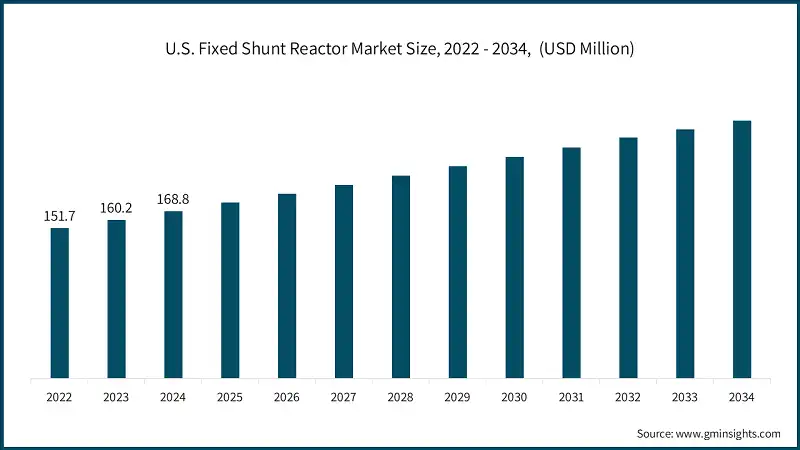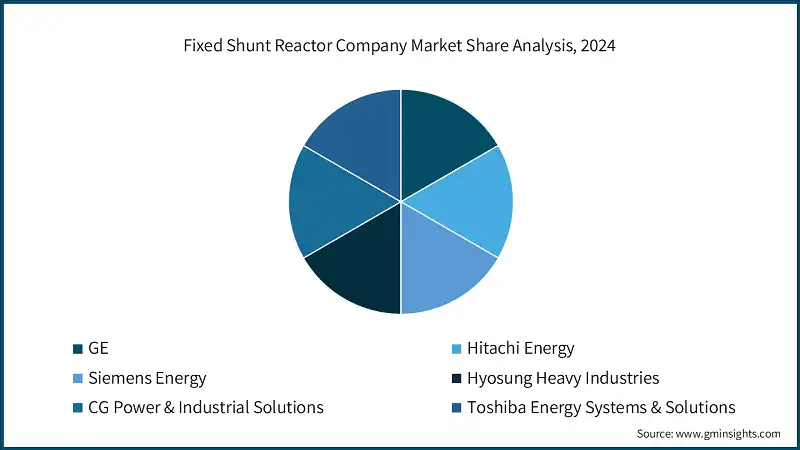Summary
Table of Content

Fixed Shunt Reactor Market
Get a free sample of this report
Form submitted successfully!
Error submitting form. Please try again.
Thank you!
Your inquiry has been received. Our team will reach out to you with the required details via email. To ensure that you don't miss their response, kindly remember to check your spam folder as well!

Request Sectional Data
Thank you!
Your inquiry has been received. Our team will reach out to you with the required details via email. To ensure that you don't miss their response, kindly remember to check your spam folder as well!
Form submitted successfully!
Error submitting form. Please try again.
Fixed Shunt Reactor Market Size
The global fixed shunt reactor market was valued at USD 1.3 billion in 2024 and is estimated to grow at a CAGR of 6.1% from 2025 to 2034, driven by rising demand for grid stability and power quality amid increasing renewable energy integration. Technological advancements, including the development of advanced materials and digital monitoring systems, are enhancing the performance and efficiency of fixed shunt reactors.

To get key market trends
Additionally, the rising investments in infrastructure development and modernization of power grids in emerging economies further boost market demand. For instance, in November 2024, Hitachi Energy, in collaboration with Kanonaden Entreprenad Mälardalen AB, will deliver Sweden's largest power quality solution for Svenska Kraftnät. Valued at USD 300 million, the project is designed to improve the transmission capacity of current power lines and facilitate Sweden's expansion of renewable energy.
Fixed Shunt Reactor Market Report Attributes
| Key Takeaway | Details |
|---|---|
| Market Size & Growth | |
| Base Year | 2024 |
| Market Size in 2024 | USD 1.3 Billion |
| Forecast Period 2025 to 2034 CAGR | 6.1% |
| Market Size in 2034 | USD 2.4 Billion |
| Key Market Trends | |
| Growth Drivers |
|
| Pitfalls & Challenges |
|
What are the growth opportunities in this market?
Fixed Shunt Reactor Market Trends
The fixed shunt reactor industry is experiencing significant growth driven by increasing demand for grid stability and the rising integration of renewable energy sources. Technological advancements in fixed shunt reactors, including digital monitoring systems and enhanced materials for better performance and longevity, are contributing to market growth. Additionally, investments in modernizing existing grid infrastructure, particularly in emerging economies, are boosting demand.
The focus on sustainability is also rising, with eco-friendly and energy-efficient solutions gaining popularity. For instance, in April 2024, Hitachi Energy invested more than USD 100 million to modernize its power transformer facility in Varennes, Quebec, in response to the rising demand for sustainable energy. This investment will increase the factory’s transformer manufacturing capacity, enhancing support for renewable energy, grid interconnections, and electrification.
Fixed Shunt Reactor Market Analysis

Learn more about the key segments shaping this market
The three phase fixed shunt reactor industry is projected to surpass USD 1.5 billion by 2034, driven by the increasing need for high-capacity, reliable grid stabilization solutions in industrial, urban, and transmission networks. These reactors are preferred for their ability to handle larger loads and deliver enhanced reactive power compensation, essential for maintaining voltage stability in high-voltage transmission lines. Technological advancements in three-phase reactor designs, including improved efficiency and reduced maintenance requirements, are further propelling their adoption, particularly in region with expanding renewable energy sources.

Learn more about the key segments shaping this market
The oil immersed insulation segment is expected to experience a robust growth rate of over 5.5% through 2034, driven by advancements in materials and increasing demand for high-performance, reliable reactors. Growing focus on reducing energy losses and improving system stability has fueled the demand for these reactors, as oil insulation offers better heat dissipation and longer operational life. Air-core reactors are gaining popularity for their compact design, lower maintenance costs, and environmental benefits, especially in smaller capacity systems. Advancements in insulation materials for both reactors are enhancing efficiency and reducing environmental impact, driving growth in this segment.

Looking for region specific data?
The U.S. fixed shunt reactor market is projected to exceed USD 250 million by 2034, led by the need to modernize the aging power grid infrastructure and support the transition to renewable energy. The U.S. government’s initiatives to promote clean energy and smart grid technologies are also contributing to market expansion. Furthermore, technological advancements in reactor design and insulation materials are improving performance, driving further adoption.
The fixed shunt reactor market in the Asia Pacific region is expanding rapidly, fueled by significant investments in power infrastructure and the integration of renewable energy. Nations such as India and China are upgrading their grids to enhance stability and support renewable energy. The growing need for effective voltage regulation and grid stability is driving the adoption of fixed shunt reactors in the region.
Fixed Shunt Reactor Market Share

Siemens Energy holds a significant share in the fixed shunt reactor industry due to its extensive global presence, strong brand reputation, and innovative technological advancements. The company offers a wide range of highly reliable and efficient products that meet the increasing demand for grid stability. Siemens Energy’s expertise in high-voltage applications and its commitment to sustainability further enhance its leadership in this market.
Fixed Shunt Reactor Market Companies
Major players operating in the fixed shunt reactor industry are:
- CG Power & Industrial Solutions
- Fuji Electric
- GBE
- GE
- GETRA
- Hitachi Energy
- Hyosung Heavy Industries
- Nissin Electric
- SGB SMIT
- Shrihans Electricals
- Siemens Energy
- TMC Transformers
- Toshiba Energy Systems & Solutions
- WEG
Fixed Shunt Reactor Industry News
- In November 2024, Hyosung Heavy Industries has secured a USD 0.20 billion contract with Ørsted, a global leader in offshore wind energy, to supply key components for a major offshore wind project. This deal enhances Hyosung's presence in the renewable energy market, particularly in offshore wind power. As part of Ørsted's initiative to expand its offshore wind capacity, Hyosung will provide critical electrical equipment to support the project's infrastructure.
- In February 2024, GE Vernova’s Grid Solutions secured multi-million-dollar contracts from Power Grid Corporation of India for 765 kV shunt reactors to boost grid stability and support renewable energy integration in regions such as Rajasthan and Karnataka. GE T&D India will manage the project, handling design, manufacturing, testing, and commissioning. The reactors will be produced at the Vadodara plant, with delivery set for the 2025-26 financial year, strengthening India’s power transmission infrastructure.
This fixed shunt reactor market research report includes in-depth coverage of the industry with estimates & forecast in terms of “USD Million” from 2021 to 2034, for the following segments:
Market, By Phase
- Single phase
- Three phase
Market, By Insulation
- Oil immersed
- Air core
Market, By End use
- Electric utility
- Renewable energy
The above information has been provided for the following regions and countries:
- North America
- U.S.
- Canada
- Europe
- UK
- Germany
- France
- Italy
- Russia
- Asia Pacific
- China
- India
- Japan
- Australia
- Middle East & Africa
- Saudi Arabia
- UAE
- Qatar
- South Africa
- Latin America
- Brazil
- Argentina
Frequently Asked Question(FAQ) :
What is the market potential for oil-immersed insulation in fixed shunt reactors?
The oil-immersed insulation segment is anticipated to grow at over 5.5% CAGR through 2034, led by advancements in materials and the demand for high-performance reactors offering better heat dissipation and longer operational life.
What is the growth outlook for the three-phase fixed shunt reactor industry?
The three-phase fixed shunt reactor market is expected to surpass USD 1.5 billion by 2034, supported by the need for high-capacity grid stabilization solutions and advancements in reactor designs improving efficiency and reducing maintenance.
How big is the fixed shunt reactor market?
The global market for fixed shunt reactor was reached USD 1.3 billion in 2024 and is projected to grow at a 6.1% CAGR from 2025 to 2034, driven by increasing demand for grid stability and power quality amid renewable energy integration.
What trends are driving the U.S. fixed shunt reactor market?
The U.S. fixed shunt reactor market is projected to exceed USD 250 million by 2034, fueled by the modernization of aging power grid infrastructure and government initiatives promoting clean energy and smart grid technologies.
Who are the major players in the fixed shunt reactor market?
Key players in the fixed shunt reactor market include CG Power & Industrial Solutions, Fuji Electric, GBE, GE, GETRA, Hitachi Energy, Hyosung Heavy Industries, Nissin Electric, SGB SMIT, Shrihans Electricals, Siemens Energy, TMC Transformers, Toshiba Energy Systems & Solutions, and WEG.
Fixed Shunt Reactor Market Scope
Related Reports


